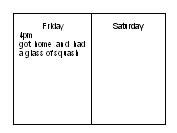water
diary
 |
A Diary |
 |
Glass of water |
You are going to create a Water
Diary to record all your interactions with water. Your water diary
will cover an entire weekend and should start on Friday evening
and end on Sunday evening. It does not matter which weekend you
select, next weekend will do.
1.
You will need to create a Water Diary, to do this make an
A5 booklet out of two sheets of plain A4 paper by folding the sheets
in half. Design a front cover with the words ‘Water Diary’
on it and your name.
2. Each
page of your diary can be for a different day or have two pages
per day, one for morning and one for afternoon.
 The
picture to the right shows roughly how your Water Diary should look
with the first entry when you finish school on Friday. The
picture to the right shows roughly how your Water Diary should look
with the first entry when you finish school on Friday.
3. Enter
the time of each water activity on the diary page for the day.
4. In
your Water Diary you will need to record all the times you used
water from a tap - water that has been purified.
• Include water for drinking, cooking, washing, flushing the
lavatory, bathing, laundry and watering the garden.
 |
Flushing the lavatory |
5. You
will also need to note down all the times you interacted with water
that had not been supplied by the Water Company and not treated.
• You might find this a little more tricky to do, think about
going out in the rain, visiting the seaside or a lake, stream or
river. You might have gone sailing, fishing or splashing around
in some puddles!
• You can draw some pictures in the diary to illustrate what
you did.
At the end of Sunday you should
have a very full diary with information about all the times over
the weekend when you used or interacted with water, using it directly
or indirectly to live. Every living thing relies on water for survival
and we human beings are no exception.
 |
Fishing in a pond |
6. Try and imagine
what your weekend would have been like without water.
7. Refer to the
water cycle (B2)
- where might you fit into the water cycle? Re-draw the water cycle
diagram and add yourself into it.
8. You might
also have a go at adding in homes, industries, farms and schools.
Think about all the ways that humans interact with the water cycle,
your Water Diary will help you to do this.
See the Water Efficiency Summary Sheet (E06a) |

